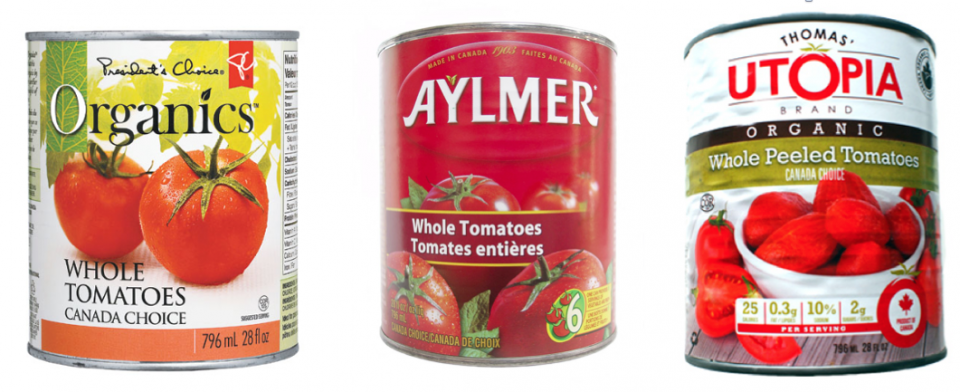Seeing red: The hunt for BPA-free free canned tomatoes
June 18, 2015
 Back when I was a kid we ate a lot of canned food. Loved me some Chef Boyardee or Zoodles for lunch, maybe a small tin of syrupy fruit for dessert. Seemed delicious at the time. My mom’s a great cook, but this was before much of my family found religion in a health food store and we started cleaning up our diets. Plus we had no idea that there were was anything fishy lining tin cans, let alone an endocrine disrupting substance called bisphenol A. Fast forward to today and there aren’t a lot of cans in my cupboard. Maybe a tin of coconut milk, somewhere in the back some Raincoast Trading sardines (not sure when anyone will get around to eating those, but they are BPA-free), oh, and a couple cans of plum tomatoes. My man was clearly an Italian nona in a past life and loves making pasta. No jarred bought sauces as a base will do, he likes plain canned plum tomatoes to make it from “scratch.” The problem is which cans do you get? Figuring that out has given me some heartburn over the years. Environmental Working Group recently issued a helpful new report on BPA in canned goods but they didn’t include Canadian brands. So I thought I’d share the latest intel I’ve gathered on the topic.
Back when I was a kid we ate a lot of canned food. Loved me some Chef Boyardee or Zoodles for lunch, maybe a small tin of syrupy fruit for dessert. Seemed delicious at the time. My mom’s a great cook, but this was before much of my family found religion in a health food store and we started cleaning up our diets. Plus we had no idea that there were was anything fishy lining tin cans, let alone an endocrine disrupting substance called bisphenol A. Fast forward to today and there aren’t a lot of cans in my cupboard. Maybe a tin of coconut milk, somewhere in the back some Raincoast Trading sardines (not sure when anyone will get around to eating those, but they are BPA-free), oh, and a couple cans of plum tomatoes. My man was clearly an Italian nona in a past life and loves making pasta. No jarred bought sauces as a base will do, he likes plain canned plum tomatoes to make it from “scratch.” The problem is which cans do you get? Figuring that out has given me some heartburn over the years. Environmental Working Group recently issued a helpful new report on BPA in canned goods but they didn’t include Canadian brands. So I thought I’d share the latest intel I’ve gathered on the topic.
One big thing to note is that despite their high acidity, canned tomatoes have actually tested lower for BPA residues than canned tuna or canned soups. I’ve seen canned tuna with over 500 parts per billion and canned tomatoes all fell under 25 ppb. Still, most people would rather see no BPA in their food at all. More and more food companies are offering BPA-free (although a lot of them don’t advertise it and won’t tell you what they’re using instead, which is disconcerting). Even when you go DIY and home can tomatoes there’s BPA in the lid, as there is in storebought glass jars so what do you do?? Here’s a run down of major brands and where they stand.
CENTO SAN MARZANO
Foodies will insist you cook with San Marzano tomatoes, imported from the Campania region of Italy. However, Cento company is also on EWG’s list of “worst players” since it still exclusively uses BPA. Cento says it’s levels average around 8 parts per billion. Also, heads up: these may be certified as authentic Italian Marzano’s but only the ones with the USDA organic seal are actually certified organic.
AURORA
Back in 2009 when Health Canada tested canned products for BPA, they found that, of canned tomato products, Aurora had the highest levels, 23 parts per billion. That’s still way lower than canned tuna or soup. Aurora tells me they don’t yet have any BPA-free options but they their best-selling tomatoes are actually strained, crushed tomatoes in a glass jar. Yes, lids still have BPA but the food contact will be less than a whole can. No organic options. Diced and jarred tomatoes come from Italy. Larger cans use Ontario tomatoes.
HUNT’S/AYMLER
Owned by food giant ConAgra, Aylmer is the Canadian sister brand to Hunt’s, though and both are big on shelves here. They stick with conventional tomatoes (treated with chemical pesticides and synthetic fertilizers) so they lose points there. However, they’ve made some headway on the BPA front and ConAgra says all Hunt’s and Aylmer whole/plum/diced tomatoes are BPA-free and ConAgra consumer reps tell me the company hopes to be totally BPA free by the end o 2015. What are they using instead? Consumer relations tells me it’s polyester or acrylic-based. They say the BPA linings will be white and the non-BPA will be more silver-coloured.
THOMAS UTOPIA ORGANIC
As a Canadian, I love that this indy brand sells only tomatoes that have been grown, packaged in southern Ontario, making them super local for me. And since they have a certified organic line they seem like the best bet. They even qualify for the 100 mile diet for a lot of Ontarians. Though when I first called them up a couple years ago, they were still using BPA. Now their website says their organic cans are BPA and I was happy to stockpile a few of their cans in my pantry. However, a call to the company reveals that they’ve had trouble with consistent supply and only about 90% of their cans are now BPA-free. Until they’re 100% BPA-free they won’t mention it on the label. Also, instead of BPA they told me they use a common “vinyl-type” alternative, favoured by the North American Metal Packaging Alliance and didn’t know much about the liner other than that. I had trouble digging up any info on their MS5330029 liner they say they use. Regular Ecoholic readers know I’m not a big fan of vinyl so this puts me in a catch-22 with this product. Local/organic = awesome. But there are still questions hanging in their about their linings. So what I mean about the heartburn?
PRESIDENT’S CHOICE
A consumer rep told me a few years ago that their PC Organics cans are BPA free but I could never get confirmation of this from anyone at Loblaw. The official response was that Health Canada “continues to conclude that there are no safety and health concerns from trace amount exposures to BPA to the general public, including newborns and young children.” Still, they added “We recognize the concern surrounding BPA and continue to work with our vendors to seek alternatives to using BPA in our product packaging where possible.” So which products are BPA and which aren’t? It’s anyone’s guess. I pestered Loblaw about this again last week and they stopped responding to my emails. It’s a shame they’re not as transparent as some of the brands they carry in their grocery stores.
WHOLE FOODS
The health food giant’s house brands aren’t entirely BPA free but they told Environmental Working Group that its 365 Everyday Value now uses BPA-free cans for its conventional tomatoes, fish, coconut milk and pumpkin as well as all 365 Organic Everyday Value canned veggies. I contacted Whole Foods media relations to see if they could give me some updated information about which cans are currently BPA-free (are the organic tomatoes?) and what they’re using instead and they just directed me to their general policy on how they’re working with suppliers to try to phase the stuff out.
EDEN FOODS ORGANIC
These guys have been working to get BPA out of cans longer than anyone (since 1999, according to Eden). You may not agree with its CEO’s stance against funding birth control for his employees but they’re one of the only companies canning low acid canned foods, like their beans (all “USA small farm organically grown”) with a costly plant-based oleoresin liner. Notably, Eden says “no suitable (in our opinion) can for high-acid food like tomatoes” (they’re not fans of vinyl and polyester alternatives). So their tomato cans still are epoxy-based and contain “a minute amount of BPA” (ie under 5 parts per billion). Which is why Eden started offering canned tomatoes in amber glass jars. Yes, there’s a little BPA in the lining of the cap, but they add an additional BPA-free coating so the BPA doesn’t contact with the food. Unfortunately, these do cost more for less product, making it out of reach for a lot of people.
So now what?
DIY TOMATOES
Love home canning, but the white inner lining of those metalic lids is actually BPA. A lot of canners just choose to look the other way on this one. There are BPA-free lids. Yes, they’re still made of plastic – Polyoxymethylene Copolymer (POM) or Acetal Copolymer so perfect solution exists. You can also hunt down old fashioned glass lidded jars, though those require rubber ringers. All that aside, you could just boil up fresh or home-frozen tomatoes. Many people want to boil these down for hours to get them ready for sauce-making. I personally like a quick tomato sauce with fresh chopped up roma tomatoes. My man does some by starting with a LOT of fresh garlic int the pan, maybe some anchovies (optional), then toss in a splash of vino, a splash of veggie broth, a dash of smoked paprika for body (optional), chop up a fresh tomato, sprinkle on some garden-fresh herbs at the end and voila – delish!!
